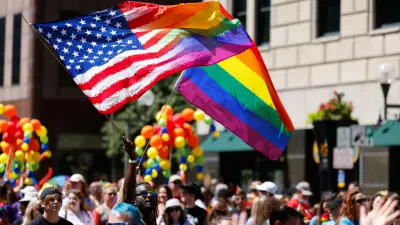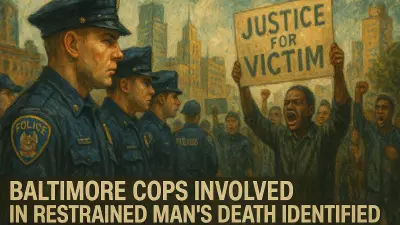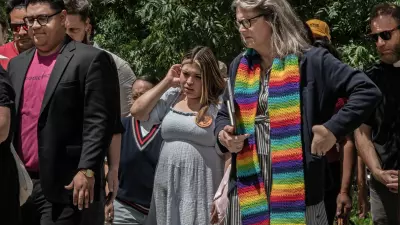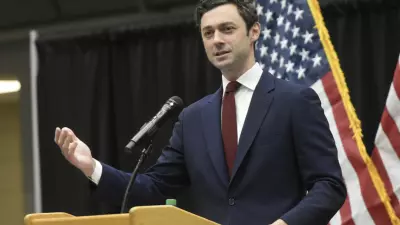Just outside of Cincinnati, the village of Golf Manor makes up little more than a half-square-mile of land, with a population, according to the 2020 census, of 3,814, most of which are people of color.

As of the beginning of the year, the village’s council included two openly LGBTQ+ members, Melody N. Mayle (who is a lesbian) and Charlotte Bruewer (who is bisexual), in a place that had the state’s first openly gay mayor way back in 2015.
“We live in a ‘gayborhood,’ for sure,” Mayle told the Capital Journal.
Ron Hirth, that openly gay mayor who is now the village administrator, called Golf Manor “kind of like a microcosm of the United States in a petri dish.”
That microcosm is growing, but is still small compared to the state’s population of LGBTQ individuals. According to the Williams Institute at the UCLA School of Law, 4.3% of Ohio’s population identifies as lesbian, gay, bisexual or transgender.
But according to the national LGBTQ+ Victory Institute, which tracks the number of officials in Ohio identifying as such, only 44 of Ohio’s elected officials are LGBTQ+ as of July 19, 2024. The number of elected officials that identify as LGBTQ+ in Ohio. (Source: The LGBTQ+ Victory Institute.)
In the state legislature, only two (Senate Minority Leader Nickie Antonio, D-Lakewood, and recently appointed state Rep. Jody Whitted, D-Madeira) are among those ranks. A single-digit number of Ohio’s judiciary openly count themselves as part of the LGBTQ+ community.
Local officials make up the largest stake of elected officials, with 39 counted by the institute, including city officials and school board members like Gahanna-Jefferson’s Dion Manley, the first openly transgender public official in the state.
“A lot of times people didn’t know trans people existed until I told them,” Manley said.
Those who are currently in the seats of government say it’s important that more among their numbers take up a cause, whether it be elected office or just community service in some way amid a divisive time in the nation’s history.
“When you’re the first, you have to show and explain to people that they can do it, too,” said Columbus City Council President Shannon Hardin, only the third Black city council president in city history, but the first openly gay council leader.
Golf Manor
For Mayle, an aerospace engineer working on her Ph.D, becoming a member of village council in 2024 was just something that happened in the midst of her attempt to bring her community together.
“I was just here to throw parties, I didn’t want to be in government,” she said.
Those parties included a Juneteenth event in 2022, that became a village event celebrated every year. Melody N. Mayle, village council member for Golf Manor, Ohio.
(Photo by Jess Summers, used with permission.)
Mayle was a resident of Golf Manor beginning in 1988, before leaving for a decade to work at a small outfit called the NASA Marshall Space Flight Center. She returned in 2018 and that’s when she started planning events to meet with her Golf Manor neighbors and people she’d known for decades. They were meant to bring people together in a way that got the diverse population talking and listening. Now that she’s on council, she also sees those events as ways to attract more people to service, and potentially a council that fully reflects the community.
“You can cast a wider net if you throw more community events and provide the opportunities to hear from each other,” Mayle said. “If you have a community of mostly single Black mothers, for example, I think the best way to represent that is by hearing from a single Black mother.”
After all, Mayle said, it was an attendee of one of her events that asked her if she would consider an opening on village council herself.
“I couldn’t tell anybody to do anything I wasn’t willing to do, so I ran for a two-year term,” she said.
She ran on a ticket that included Bruewer, and Mayle said they were “elected to rock the boat.”
But after testing the boundaries as an elected official and learning the village’s inner workings, Mayle took on a new motto:
“Rock the boat, don’t capsize the boat.”
Before becoming the village’s chief administrative official, Hirth had a similar experience to Mayle in 2013, when he’d been in Golf Manor for a decade, and his reputation led to a phone call his husband Steve answered.
“They said there was an opening on village council, and he handed the phone to me and said ‘it’s for you,’” Hirth told the Capital Journal.
When he ran for council, as well as when he ran for mayor, he didn’t do it without an awareness that he may become a “target” because of his sexual orientation. But the small town nature of his area meant other things were bigger issues for him and for his community.
“We needed to get our roads fixed, people needed to get home without running into potholes,” Hirth said.
In that way, small town government is the most efficient way to answer constituent problems, according to Hirth. Living in the community, running into the same potholes as the neighbors in a town means the problems are all the same for government officials and residents alike.
“You see the breakdown with the partisan (Ohio) Senate and the House, and we just don’t have that,” Hirth said. “When I’m out talking to my neighbors, I have the same frustrations as the other people in this area.”
With a background in budgets and personnel, Hirth saw his role within the village to implement “basic business principals” and use what little financial resources the village had (and received through the state’s local government fund) as best they could.
If it hadn’t been for that first call about the open village council spot, Hirth said he might never have been involved in the way that he is now.
Having been a part of the Human Rights Coalition, he saw the importance of grassroots efforts to bring business and people to the community, and therefore, more money. Financial stability and diversity of opinions are Hirth’s hallmarks for the future of the community and everywhere else.
“I think what’s happening (now) is that it’s a grassroots movement where you have people like Melody and Charlotte who see the need to have those voices,” Hirth said.
Mayle campaigned on maintaining a non-discrimination ordinance the village had fought for years before, which came with its own share of boat-rocking and negotiating.
In 2020, the village approached the voters with an ordinance they’d already passed within council. It was an ordinance in Ohio “to combat discrimination and for the guarantee of equality and inclusion,” done in collaboration with Equality Ohio.
The document proclaims Golf Manor to be “proud of its diverse community of individuals from various backgrounds, religions, ethnicities, nationalities and ideologies, including persons with a different sexual orientation or gender identity or expression.”
“It was meant to be a resource for people and a statement to the world that Golf Manor is an inclusive community,” said Hirth, who had become village administrator (a non-elected position) two years earlier.
Hirth said the village leaders and council were looking to have a “human rights commission” for problems residents had encountered, so the village could be a “referral service … to be able to get those issues taken care of.”
The ordinance “encourages all persons to be fully engaged in protecting and supporting each person’s civil rights, to be free from discrimination and to enjoy the liberties afforded to every citizen.”
Though the ordinance had already been passed and signed by Mayor Stefan Densmore on Jan. 27, 2020, residents would ultimately have their say as well.
The ordinance passed with more than 70% of the vote.
According to Equality Ohio, Golf Manor is one of 35 municipalities and one county in Ohio with non-discrimination laws at the local level.
Proximity
As Columbus was looking to fill out its city council ten years ago, former mayor Michael Coleman looked to a former intern who was now his director of affairs and outreach. It was on a flight back to Columbus that Coleman told Shannon Hardin to run for the seat. Hardin said he was “too liberal for this city,” and Coleman pushed for another reason why he wouldn’t run.
“I told him ‘I’m young, I’m Black, and well, I’m gay,” Hardin said.
According to Hardin, Coleman said “that’s only an issue if it’s an issue with you.”
“It definitely was that moment that changed my thoughts on how I wanted to serve,” Hardin told the Capital Journal.
Now serving as the city council’s president, he recognizes the part his intersectionality plays in his role, as much as it does in his life, and he also knows that there’s not enough people representing that cross-section of life in public office.
It would not be true service to not have all of my identity. When you come from marginalized communities … you understand that there are challenges, that there are historical obstacles that you’ve overcome.
– Shannon Hardin, Columbus City Council President
He faced struggles when he ran as a gay man who was also loyal to his church. His church community found out he was running for council, and said they could not endorse him as a gay man.
He said it hurt to hear, but he stayed with the church, and the “very conservative pastor” ended up as one of his biggest supporters, Hardin said.
Those experiences have taught Hardin a theme in his life and in the path to bring more LGBTQ+ members to acceptance: proximity.
“I think that proximity when we try to change hearts actually is important,” Hardin said. “You can’t ignore the pain of a person if you’re in close proximity to them.”
Manley said he felt some apprehension from people as he ran for his school board seat. But once he had his say, he realized people liked what he had to say.
“I have listened to hurtful things or judgmental things, and I just hear it as their views,” Manley said. “To have them get to know us, and to have that exposure to what we have to say makes the difference.”
The path ahead
Shannon Hardin, Columbus City Council President, speaks at a press conference before Columbus Pride in June, standing with fellow LGBTQ+ elected officials in the state. (Photo from the City of Columbus website.)
In June 2024, Hardin led a press conference before Columbus Pride, in which he stood with other elected officials with whom he said he joined to “talk policy.”
“When Columbus is welcoming, it grows our city … and likewise when the state of Ohio is open and welcoming, we’re able to attract more folks who want to be a part of this great state,” Hardin said at the conference.
But Hardin acknowledges that politics, at any level, is “harder and worse now than when I got into office 10 years ago.”
“The lack of civility, the lack of respect or belief in any kind of institution has made it almost dangerous for elected officials,” he said.
But for him, local government is the “last best place for democracy to flourish,” because of the proximity to all sorts of different people. On his worst days, it only takes going to the grocery story, what he calls his “Kroger Caucus,” to be reminded of who he works for and why he does what he does.
“These issues have to be seen as all of our issues, and it’s just incumbent on all of us to do our part to make sure that in these historic moments our voices are heard,” he said.
When it comes to getting more LGBTQ+ (and other marginalized groups) into positions of authority, making those who want to join their city council or township trustees not feel like their fighting alone can make it all the more appealing.
“We have to try to make sure that folks see this as a collective effort, that they’re not alone, that at the local level they feel supported,” he said.
Hardin also said while the country is at an “inflection point,” it’s at times where things seem “imperfect” that history shows those who speak up will make a difference. That difference starts at the ballot box.
“We can take this very imperfect thing and do the least of this thing and just go to the polls and make our voice heard,” he said.
Mayle and Hirth both see the benefits of getting into local government as a way to make a difference, but they understand the hesitation some can have in taking that step.
But as the future continues with moves at the state level to hinder gender-affirming care for transgender individuals and discussions of how justices at the U.S. Supreme Court can impact issues like same-sex marriage, Mayle says the representation needs to be just that: representative of the people these decisions impact.
“The people in (government) should look like you, there’s value in that,” she said. “You need people that actually understand that.”
Manley sees the future in the students of his district and around the state, who are more engaged than ever before, as book bans and parental curriculum control – some which seeks to remove mention of LGBTQ+ people – remain hot topics.
“Students are questioning things like never before, and they see through fear tactics from people who want to convince them to think a certain way,” Manley said.
Hirth has the same advice for those looking at the future of the country as he does for his own village and it’s economic health.
“Moving forward, don’t look backwards,” he said.
This story has been edited to clarify the sexual orientations of the Golf Manor village council members.
Ohio Capital Journal is part of States Newsroom, a nonprofit news network supported by grants and a coalition of donors as a 501c(3) public charity. Ohio Capital Journal maintains editorial independence. Follow Ohio Capital Journal on Facebook and X.







